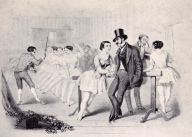 Prostitution
Prostitution
While prostitution was abhorred by the morally-upstanding and respectable bourgeoisie, it was considered a necessary evil. How the prostitute was viewed in the nineteenth century is summed up in Augustine’s De ordine:
"
What can one find that is more ignoble, more deprived of honor,
more charged with turpitude, than commercial women, procurers and all such
scourges.
If one suppresses prostitutes, the passions will convulse society; if one
gives them the place that is reserved for honest women everything becomes
degraded in defilement and ignominy. Thus, this type of human being, whose
morals carry impurity to its lowest depths, occupies, according to the
laws of general order, a place, although certainly the most vile place,
at the heart of society." (Corbin
1987, p. 213-214)
This statement addresses and attempts to negotiate the problematic existence
of the prostitute. A necessary evil, she provides an outlet for “the
passions” that would destroy society/civilization if not released.
However, the prostitute cannot be honoured for the sacrifice she makes
for society, precisely because it is her honour that she is giving up.
If permitted into respectable society, the prostitute would debase and
perhaps corrupt honest women.